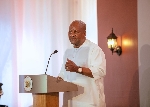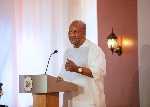24-hour economy: Emulate China’s industrial strategy to revive manufacturing sector-GFL
 China flag
China flag
The Secretary-General of the Ghana Federation of Labour (GFL), Mr. Abraham Koomson, has called on the government to draw lessons from China’s successful industrial policies as a blueprint to revive and grow Ghana’s ailing manufacturing sector.
Mr. Koomson emphasised that manufacturing is key to Ghana’s economic recovery, job creation, and long-term transformation.
He stressed the urgent need for the government to provide targeted support through tax reliefs and strategic incentives.
“As someone who has been deeply involved in the manufacturing space for years, I know what’s holding the sector back,” he said.
“All manufacturers need is a supportive environment—reduce the excessive taxes, and you’ll see results.”
Mr. Koomson made the remarks while reacting to the government's newly launched 24-Hour Economy and Accelerated Export Programme, which aims to drive round-the-clock productivity and boost exports.
While commending the intent behind the initiative, the labour leader warned that without specific, production-focused support, particularly for local manufacturers, the programme could fail to deliver a lasting impact.
“The 24-Hour Economy is not new,” he noted. “In the 1970s, we had companies like VALCO, ALUWORKS, GTP, and ATL running three shifts a day.
That was the standard. But over time, high taxes broke their backs. They were producing, but couldn’t market their goods competitively due to the cost burden.”
Mr. Koomson urged the government to study China’s industrial policy, where export-oriented manufacturing is supported through aggressive incentives, including tax breaks, infrastructure investment, and direct policy backing.
“In China, when you manufacture for export, the government supports you,” he explained.
“They offer tax breaks and policies that help you produce efficiently and sell competitively on the global market.
Ghana can do the same.”
He argued that a similar strategy in Ghana would reduce reliance on imports, save foreign exchange, strengthen the local industrial base, and provide sustainable employment opportunities for the youth.
The GFL Secretary-General emphasised that Ghana must shift from rhetoric to strategic action if it hopes to rebuild its manufacturing sector.
He noted that past industrial success stories were undone by unsupportive fiscal policies and rising operational costs.
“If we adopt a similar strategic approach as the Chinese, we can rebuild our industrial base,” he said. “It’s time to prioritise production and give manufacturers the breathing space to thrive.”
Mr. Koomson reaffirmed the Ghana Federation of Labour’s commitment to supporting the government with practical, experience-driven recommendations and called on policymakers to engage closely with industry players in shaping national economic policies.
“We are ready to contribute ideas and experience to make the 24-Hour Economy and other initiatives work. But let’s make sure we focus on the sectors that matter—starting with manufacturing.”
He spoke on Ahotor FM’s Yepe Ahunu show on Saturday,
Source: Classfmonline.com/Cecil Mensah
Trending News

kyebi: Ghana National Fire Service College donates items to Asiakwa SOS Children's Village
16:59
Gov't launches 24-hour economy policy to boost national productivity and growth
11:54
National Day of Prayer: President Mahama welcomes Cardinal Turkson
02:39
NPP Diaspora eyes collaboration with IDU to empower youth
16:49
“Let’s not wait for a coup before we speak”-NALAG President appeals to ECOWAS, AU
11:46
66 Ghanaians rescued from Human trafficking ring in Nigeria – Police
19:49
Omane Boamah backs EC’s decision to re-run Ablekuma North polls
12:11
GA/R: Tensions rise in Dawa as farmlands are destroyed by private developer
11:18
NPP dissociates itself from Abronye DC’s comments against Archbishop Duncan-Williams
15:02
Mahama urges judicial renewal at swearing-in of Supreme Court justices
11:49




